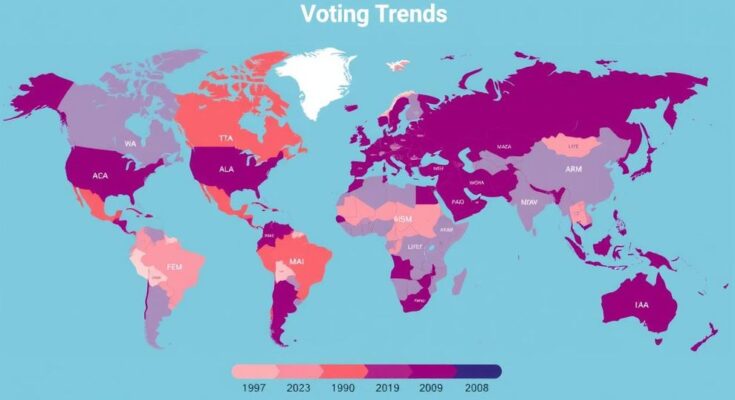The 2024 global elections involved over 70 countries with more than 1.7 billion voters. Key countries included India and the United States, with a notable diversity in voter turnout ranging from 98.2 percent in Rwanda to only 28.8 percent in Tunisia. Many incumbents retained power, while significant political transitions occurred in places like Bangladesh and Austria, reflecting evolving democratic landscapes worldwide.
In 2024, elections were held across 70 nations, with over 1.7 billion individuals participating. The collective population of these voting countries approaches four billion, representing approximately half of the global populace. Notable electoral exercises took place in India, the United States, and Indonesia, among others, producing some expected and some surprising outcomes. The overall average voter turnout globally was recorded at 61 percent, with stark contrasts in participation levels among various nations. For instance, Rwanda saw an impressive voter turnout of 98.2 percent, while Tunisia recorded a mere 28.8 percent. In India, the world’s largest democracy, Prime Minister Narendra Modi’s Bharatiya Janata Party fell short of a parliamentary majority for the first time since 2014, leading to the formation of a coalition government. Each country’s electoral landscape presents unique challenges and trends, reflecting both historical trajectories and contemporary societal issues. This year’s elections showcased a blend of established leaders securing victories alongside significant transitions in leadership, notably in Bangladesh and Austria.
The 2024 elections represented a significant event in global democratic processes, featuring a diverse range of political landscapes and systems. Nations such as India and the United States had unprecedented voter turnout, while countries like Tunisia faced drastic declines in participation. The elections highlighted the struggle for democracy in some regions, against the backdrop of rising political tensions and societal unrest. Moreover, the political dynamics in countries with long-standing leadership, such as Russia and Rwanda, revealed how incumbents continue to maintain their positions amid controversy. Simultaneously, the emergence of new leaders pointed to potential changes in governance and policy direction in several countries, pushing forward the dialogue on democracy worldwide.
In summary, the elections of 2024 reflected a diverse spectrum of outcomes, with various countries experiencing shifts in power dynamics as well as stability in established leadership. The global average voter turnout of 61 percent signifies a robust engagement in democratic processes, although marked disparities were observed across different nations. Importantly, as countries navigate the complexities of their electoral systems, the interplay of incumbents and emerging leaders presents both challenges and opportunities for the future of governance and democracy worldwide.
Original Source: www.aljazeera.com




